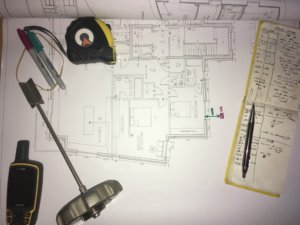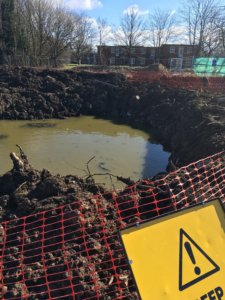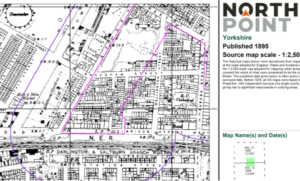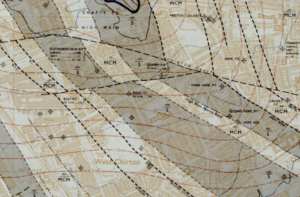Q & A with Northpoint
20th November 2021
Northpoint dissects commonly asked questions about Geotechnical and Geoenvironmental Services and Engineering
Whether attending a CPD seminar, networking event or even talking to family and friends, the first question asked about work is – what is Northpoint? Northpoint is a geotechnical and geoenvironmental engineering consultancy. In the majority of cases, this line of engineering is a new concept to many, and Northpoint’s initial response is met with a mixed response. Because of this, Northpoint has provided a brief Q&A explanation into the geotechnical and geoenvironmental services sector.
What is Geotechnical Engineering?
 Geotechnical engineering assesses the properties, strengths and characteristics of soils and rocks to inform safe design. The assessment process aims to predict how the ground at shallow depth, and deep within the earth will react to any changes (such as placing a heavy structure onto or into the ground). Design can vary from foundation recommendations (for a house, office, bridge etc.), road and pavement design, to the stability of rock mass structures, slopes and embankments.
Geotechnical engineering assesses the properties, strengths and characteristics of soils and rocks to inform safe design. The assessment process aims to predict how the ground at shallow depth, and deep within the earth will react to any changes (such as placing a heavy structure onto or into the ground). Design can vary from foundation recommendations (for a house, office, bridge etc.), road and pavement design, to the stability of rock mass structures, slopes and embankments.
Geotechnical engineering relies on intrusive ground investigation works (such as boreholes) and laboratory testing to inform design.
What is Geoenvironmental Engineering?
Similar to geotechnical, geoenvironmental services also assess the properties of materials beneath the ground to inform safe design. Design is different from geotechnics in that it aims to protect public health, construction workers, building structures, ecology and water environments from hazardous materials. This is often referred to as a contaminated land assessment, and considers the legacy of former uses (such as landfills, industrial use, railway land etc.). The process of evaluation includes considering a source of contamination, a receptor (such as a resident) and how the contaminant comes into contact with the receptor.
Laboratory Contamination testing informs design, and this target hazardous materials in the ground such as asbestos, heavy metals, fuel oils. Geoenvironmental Engineering also considers other contaminants such as hazardous ground gases, radon and mine gas.
What is the process of undertake a full appraisal?
 British Standards and other guidance documents are consistent in that a phased approach is required for an appraisal. This commences with a Phase 1 Desk Study; the evidence gathering stage.
British Standards and other guidance documents are consistent in that a phased approach is required for an appraisal. This commences with a Phase 1 Desk Study; the evidence gathering stage.
The desk study is used to design the Phase 2 Ground Investigation phase which encompasses intrusive field works and laboratory data to establish a level of risk, and how this can be safely mitigated.
For geoenvironmental engineering elements (such as land contamination), if unacceptable risks are recorded, the data from the Phase 2 is used to inform an Options Appraisal and Remediation Strategy (outlining the various requirements of the clean-up process).
The final stage is validation and verification that the remedial works have been completed in line with the strategy.
What is a Preliminary Risk Assessment?
 Most often, a local planning authority will use terminology such as Preliminary Risk Assessment. This is the same as a Phase 1 Desk Study Report.
Most often, a local planning authority will use terminology such as Preliminary Risk Assessment. This is the same as a Phase 1 Desk Study Report.
The desk study must include a site walkover (reconnaissance) survey to assess the land for potential contaminants, invasive weed species, tree influence, evidence of potential flooding problems, obstructions, visually assess any obvious utilities runs (such as drains), and assess access/egress for future plant used during the Phase 2 Intrusive Ground Investigation.
The desk study considers historical plans, geological maps and records (including mining and radon) and data relating to landfills, waste, former industrial use and environmental data (such as Environment Agency flood mapping). This information is used to design the preliminary Conceptual Site Model (Source-Pathway-Receptor relationships) and inform the design of a targeted Phase 2 Ground Investigation.
 A slight variant of a Desk Study (whilst still a ‘desk-based’ exercise) is a Coal Mining Risk Assessment. This focuses in-depth on the geology beneath the ground to assess whether a development proposal is at risk from former underground coal workings (this could include the presence of shafts/adits, and shallow coal seams that have been worked in the past).
A slight variant of a Desk Study (whilst still a ‘desk-based’ exercise) is a Coal Mining Risk Assessment. This focuses in-depth on the geology beneath the ground to assess whether a development proposal is at risk from former underground coal workings (this could include the presence of shafts/adits, and shallow coal seams that have been worked in the past).
Such assessment needs to be undertaken by a Chartered Geologist, who will consider a wealth of available data to inform the report, such as British Geological Survey mapping, data, technical memoirs to Coal Authority records (such as Mine Abandonment Plans and available GIS data).
What is a Site Investigation?
Site and Ground Investigation are broadly the same thing. They rely on physically assessing whats on and below to ground (through methods such as boreholes, trial pitting and probing). Often soil and rock samples are brought back to the surface, and the engineer will deliver these samples to the laboratory for testing. The laboratory testing determines the characteristics and properties of soil and rock (both physically and environmentally). This informs the Phase 2 Site or Ground Investigation Report.
 Given the close nature of both geotechnical and geoenvironmental engineering disciplines, the Phase 2 report normally encompasses both risk assessments. Consultants tend to use varying titles to their reports, but they are broadly the same thing (i.e. Phase 2 Site Investigation, Ground Investigation, Geoenvironmental Appraisal). In summary, the Phase 2 is intended to confirm risks (both geotechnically and environmentally), and update the Conceptual Site Model prepared during the desk study phase.
Given the close nature of both geotechnical and geoenvironmental engineering disciplines, the Phase 2 report normally encompasses both risk assessments. Consultants tend to use varying titles to their reports, but they are broadly the same thing (i.e. Phase 2 Site Investigation, Ground Investigation, Geoenvironmental Appraisal). In summary, the Phase 2 is intended to confirm risks (both geotechnically and environmentally), and update the Conceptual Site Model prepared during the desk study phase.
Northpoint specialise in geotechnical and geoenvironmental engineering. Our team of Chartered professionals undertake comprehensive Phase 1 Desk Studies, Coal Mining Risk Assessments, Phase 2 Site Investigations and interpretive reporting, Remediation Strategies and Validation/Verification services.
If you require any project assistance regarding geotechnics or land contamination, Northpoint are here to guide you through each stage of the project cycle.


